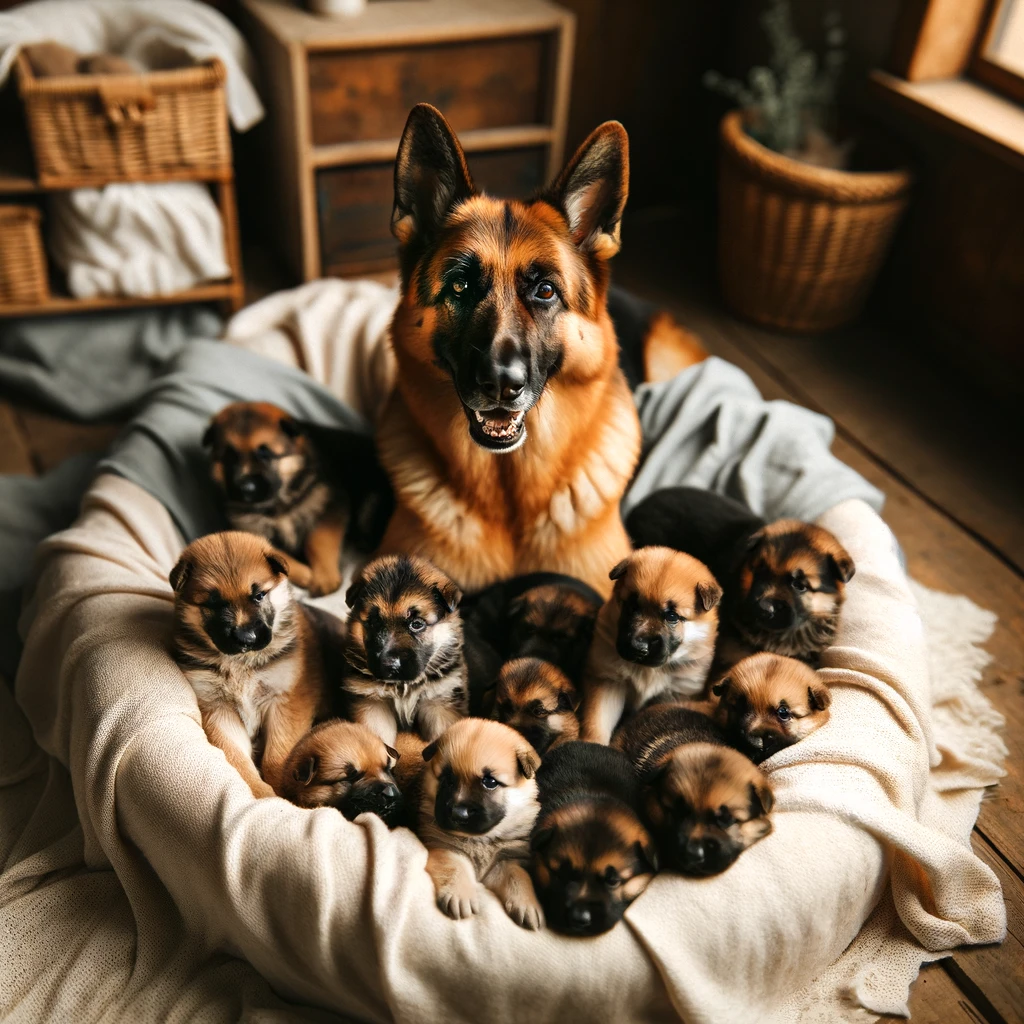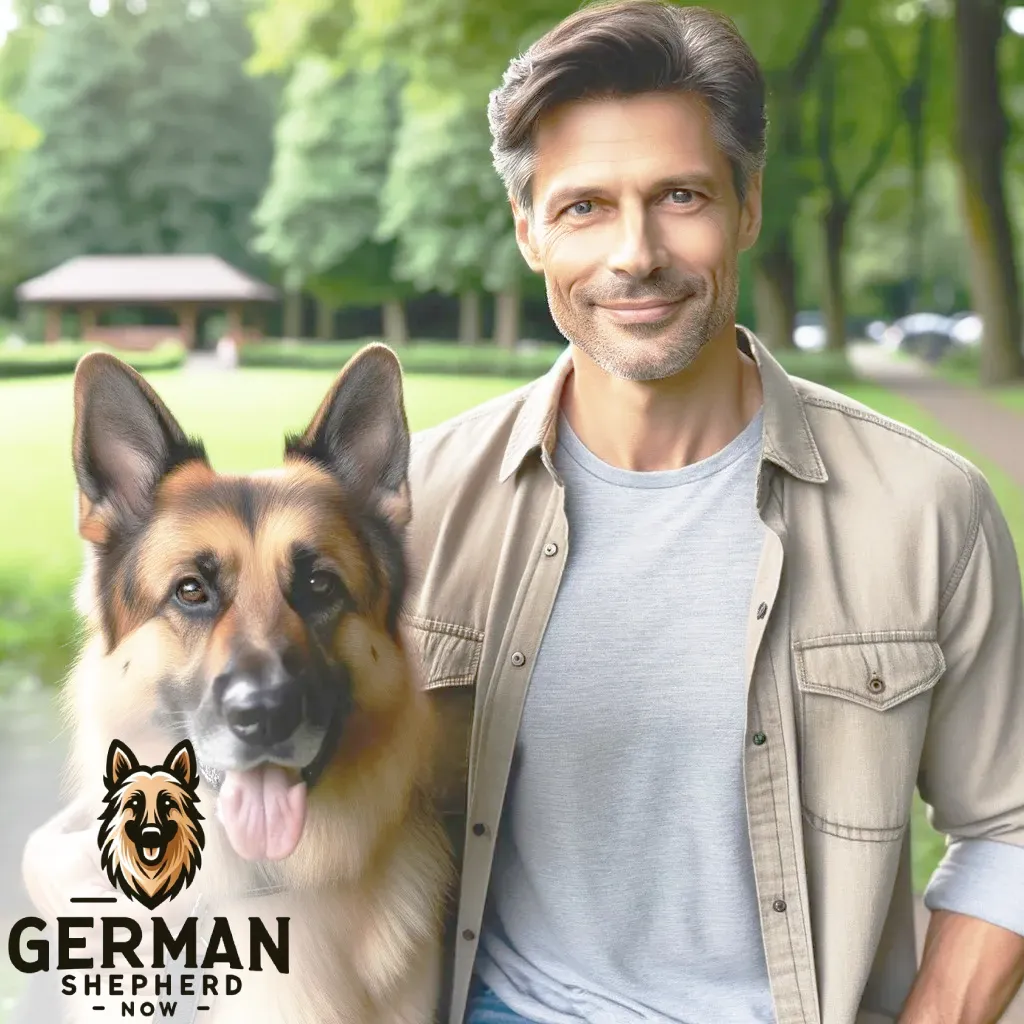How Many Puppies Do German Shepherds Have

On average, German Shepherds have about 8 puppies in a litter. The number can vary, with typical litters ranging from 4 to 9 puppies.
Factors like the mother’s age, health, and genetics can influence the litter size. Larger litters of up to 15 puppies are less common but possible.
German Shepherd Litter Size
German Shepherds are smart and can do many jobs, like police work or being a family pet.
They usually have between 5 to 9 puppies. The mom’s age, health, genes, and how she’s cared for when pregnant can affect this.
Younger German Shepherd moms often have fewer puppies the first time but more later. Bigger litters aren’t as common and can be risky for moms and puppies. Good breeding, like proper vet care and feeding, is really important.
Knowing how many puppies to expect is key for breeders and people wanting to adopt, as it changes how much care and stuff the puppies need.
Factors Affecting German Shepherd Litter Size
German Shepherds are loved for their loyalty and smarts. The size of their litter can change a lot because of many things.
Breeders and people who want a German Shepherd should know this stuff.
Genetics: In German Shepherds, genes are important for deciding how many puppies there will be. Some moms might have more puppies because of their family history. This is because of many genes, not just one. The family tree can give clues about how many puppies to expect.
Age of the Mother: How old the mom is matters. Younger ones usually have fewer puppies at first but more as they age. After 5 years, they usually have fewer puppies.
Health and Nutrition: How healthy the mom is and what she eats before and during pregnancy are super important. A healthy, well-fed mom is likelier to have a big, healthy litter. She might have fewer puppies if she’s unhealthy or eats poorly.
Reproductive Health: The mom’s reproductive health affects how many puppies she’ll have. Things like infections or hormone problems can make her have fewer puppies. Regular vet visits can help find and fix these issues.
Frequency of Breeding: Breeding a mom too much can cause her to have fewer puppies over time. It’s best not to breed her whenever she wants better litters.
Breeding Timing: When she’s bred during her cycle matters. The best time is a few days after she is ready to mate for more puppies. Too early or too late can mean fewer puppies.
Male Fertility: The dad’s fertility matters too. His age, health, and genes can change how many puppies are born.
Environmental Factors: Things like stress, where she lives, and bad stuff in the environment can change how fertile the mom is. A stress-free place with lots of room and clean air is best for more puppies.
Parasite and Disease Exposure: Staying away from diseases and parasites is important for keeping the mom’s reproductive system healthy. Regular treatments like deworming and shots help a lot.
Breed-Specific Factors: Different German Shepherds, like working or show types, might have different average litter sizes. This is because of how they’ve been bred over time.
Caring for Puppies After Birth
Taking care of puppies right after birth is key for them to grow up healthy. They need a warm and safe place because they can’t keep themselves warm. It is important to watch them to ensure they eat enough from their mom.
Colostrum, the first milk, is good for them. Watching for any problems, like not breathing well or not eating, is crucial. Their bed should be clean and dry to avoid getting sick. Around 2-3 weeks, they start to see and hear, so they should get used to light and sound.
Getting them used to people by touching them is also important. Regular vet visits are needed to check their growth, give shots, and keep them healthy.
Caring for a German Shepherd After Giving Birth
Taking care of a German Shepherd after she has puppies is as important as when pregnant. She needs a quiet, cozy, clean place to rest and feed her puppies.
The place should be calm, with nice bedding that’s kept clean.
Nutrition and Hydration: The mom needs food full of good stuff to help her feed her puppies and get better. She should always have water because feeding puppies makes her thirsty.
Monitoring Health: Watching the mom for any problems after giving birth is important. She must see a vet immediately if she acts weird or has signs of sickness.
Allowing Rest and Recovery: The mom needs lots of rest after having puppies. Keeping her calm and letting her sleep with her puppies is important.
Veterinary Check-ups: Vet visits after the puppies are born are needed to ensure the mom is okay. The vet checks her health, looks for any leftover birth stuff, and makes sure her feeding parts are healthy.
Monitoring for Mastitis: Mastitis is when the feeding parts get infected. Watching for swelling, redness, heat, and odd behavior is important. A vet should check her if she seems sick.
Bonding and Nursing Time: The mom needs quiet time to feed and bond with her puppies. This helps the puppies eat enough and helps the mom take care of them.
Gradual Exercise: Slowly starting to walk the mom again after she gets better is important for her health. Start with short walks and make them longer as she gets stronger.
Emotional Support: German Shepherds are sensitive and might feel different after having puppies. Being kind and loving helps her feel safe and happy.
Managing the Puppies: Ensuring the puppies are healthy, eating well, and growing is part of caring for the mom. Watching their weight and making sure they eat and stay warm is important.
Caring for a German Shepherd and her puppies means looking after their bodies and feelings and keeping a close eye on them. This makes sure the mom and her puppies are healthy and happy.
Ensuring Healthy Beginnings for German Shepherd Puppies
Caring for a German Shepherd and her puppies is a mix of natural things and care. Usually, a German Shepherd has 5 to 9 puppies.
The mom’s age, health, genes, and where she lives can change this. Bigger litters need more care for the mom and puppies.
After birth, the focus is on giving the mom and puppies a good place to live, ensuring they eat and drink well, and watching their health.
Breeders and people who want to adopt must understand all this to ensure the mom and puppies grow healthy and happy.

I’m Martin, and I grew up in the super cool city of Seattle. You know, the place with all the incredible mountains and forests? Yeah, that’s my playground!
Ever since I was little, I’ve been all about nature. I used to wander around the woods with a notebook, doodling all the cool plants and animals I’d find.
